My mom and I work with a 5 year old boy who, for his chronological age, is very advanced in some things but still has difficulties in others. However, we have accompanied him since August in his learning process, and that has allowed us to discover so many things that reaffirm the saying that not everything is taught in college (sometimes even the years of experience alone are not enough, but they give you a great advantage). That is why we have been forced to reinvent ourselves with strategies that make it easier for us to work with our little one.


A friend who knows what we do, has already sent me videos of didactic games, and that is how I found out about this ingenious way of playing tetris, a game that we have all played at some point. It is actually a video game from 1984 and it is basically a game that consists of fitting pieces of different shapes, these pieces are usually of different colors.
These pieces go in a downward direction when they appear on the screen, so you have a short time to think of the right way to fit them with the others. When you create a complete line that covers the playing field, these are eliminated so that you have more space to continue with the others, and you win when you manage to fill the field with all the pieces perfectly fitted (although you earn more points if you manage to fit and eliminate them before the field is full).
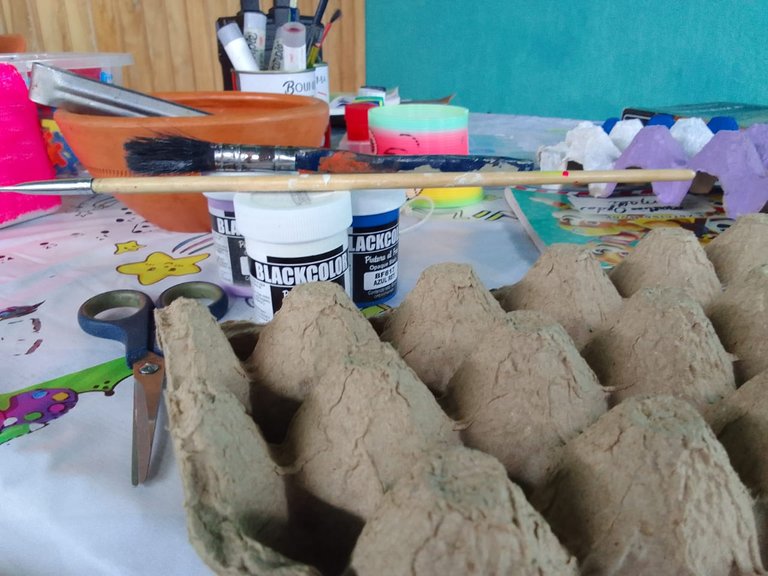
In this version, we cannot remove the pieces but the fitting action is maintained, creating a fun puzzle with unconventional shapes for those children who are still unfamiliar with this entertaining (and apparently simple) game. Without further ado, I will tell you about the materials I used:
- Two egg cartons (they can be larger than the ones in the photo, but I used the ones I had at home).
- Scissors.
- Cold paint (in the colors of your choice).
- A small paintbrush.
- A paintbrush.
These materials are very easy to get, and we usually have them at home. Since this was my first time making this game, I used small egg cartons because it was what I had at home, but after finishing it and testing it with my family, I realized that not only is it fun, but it would be even more fun if it were bigger, so soon I will try to make a bigger one. Anyway, continuing with the game, the steps are very simple.
1. I painted the lids, because it is necessary to use the bottom part of the cardboard, and I did it taking into account how the tetris figures look like. I used three colors (royal blue, purple and white).
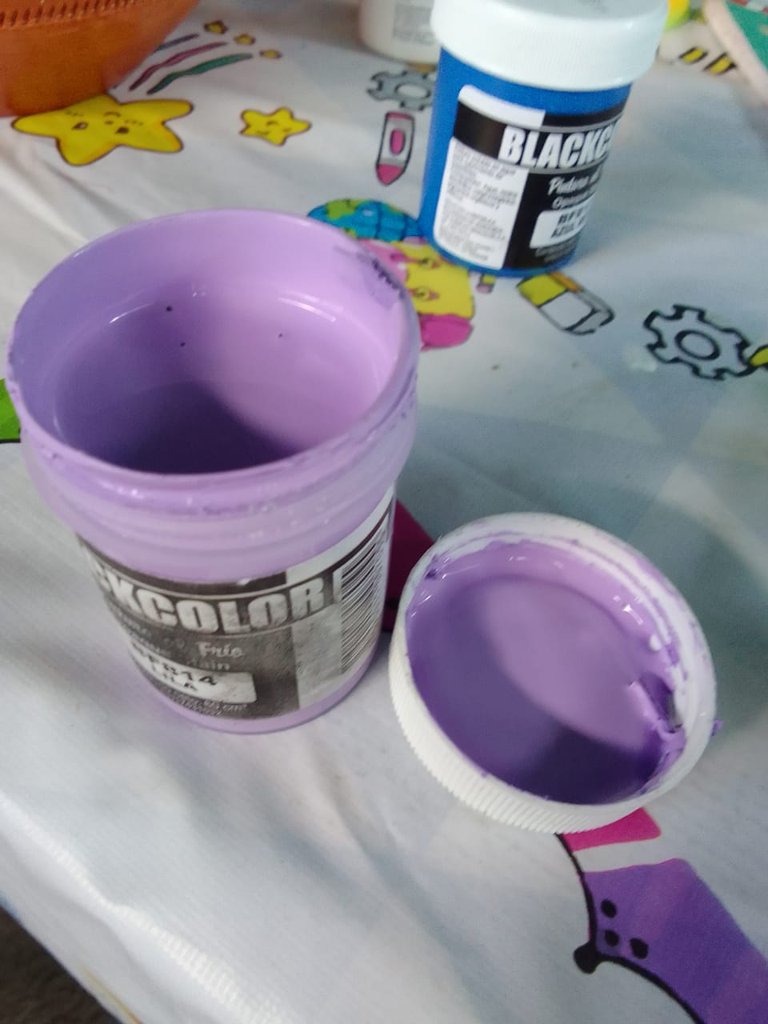
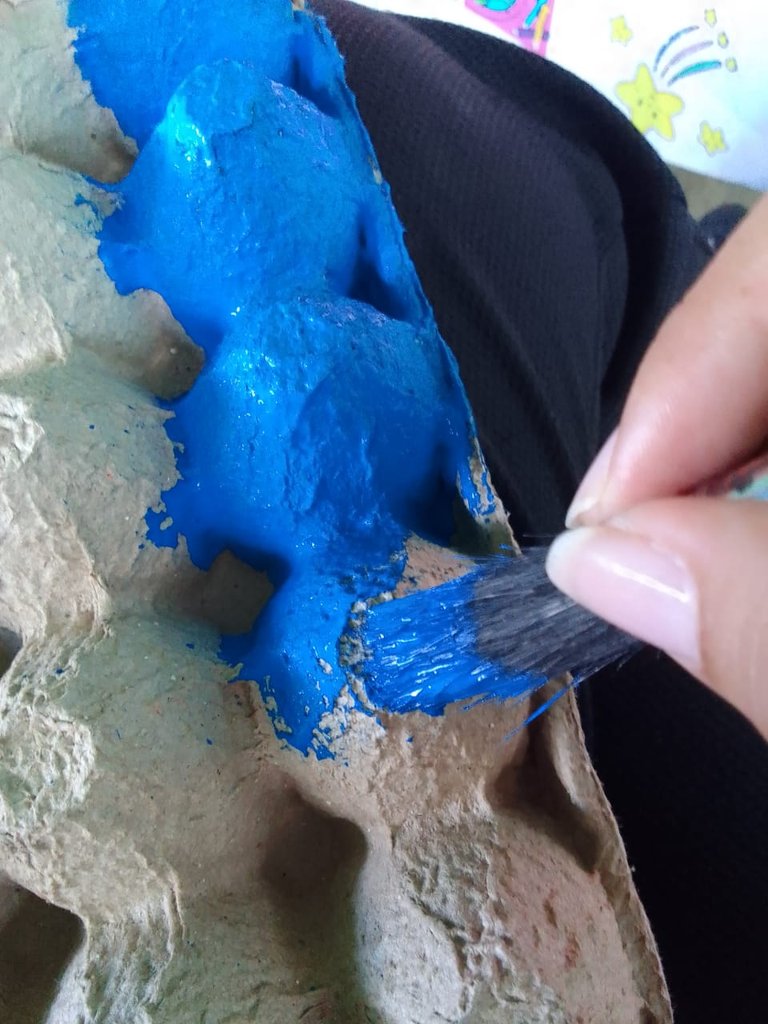
2. After I knew what each piece was, I waited for the paint to dry very well and cut out each piece. I painted them with the brush, although a thick brush can also work, and after cutting them out I retouched everything with a fine brush.

3. And finally all that's left is to fit them together and start playing!
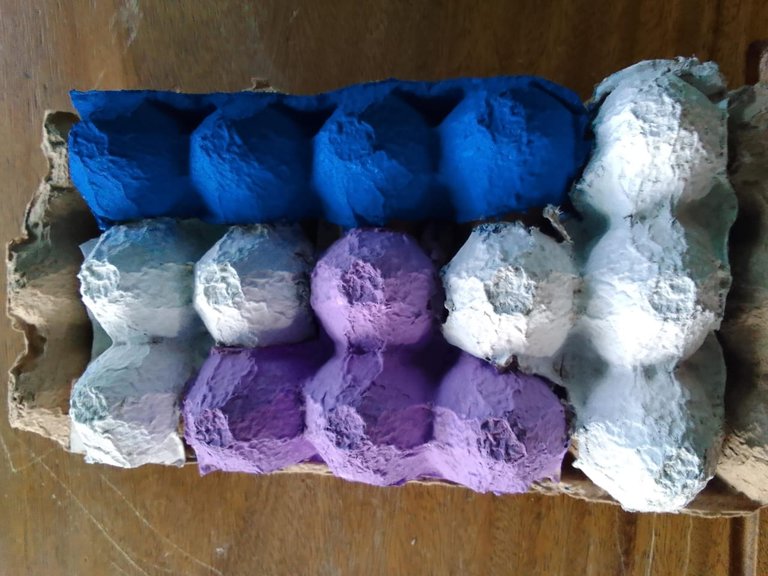

I can't emphasize enough how amazing this game is, especially if we expose children to learn different skills and abilities with games that they can even make themselves, taking advantage of recyclable materials that can be recycled and have a recreational and educational purpose.
Tetris, as a visuospatial activity, has as a benefit the improvement of coordination, memory and concentration capacity, besides it has direct effects in contributing to reduce anxiety levels, so more than a game, it is a pedagogical and therapeutic tool very easy to do. My mom has saved another couple of cartons for our little one to make everything from scratch, so I can't wait for him to do it and above all, to play with us. I hope you liked this version of tetris and are encouraged to try it out on your own!
Mi mamá y yo trabajamos brindamos asesoría a un pequeño de 5 años que, para su edad cronológica, es muy avanzado para algunas cosas pero para otras todavía presenta dificultades. Sin embargo, le acompañamos desde agosto en su proceso de aprendizaje, y eso no ha permitido descubrir tantas cosas que reafirman el dicho de que no todo te lo enseñan en la universidad (a veces ni los años de experiencia son suficientes por sí solos, pero te dan una gran ventaja). Es por eso que nos hemos visto en la obligación de reinventarnos con estrategias que nos faciliten el trabajo con nuestro pequeño.


Un amigo que conoce lo que hacemos, ya me ha enviado vídeos de juegos didácticos, y así es como me enteré de esta ingeniosa manera de jugar al tetris, un juego que todos en alguna oportunidad hemos jugado. Se trata en realidad de un videojuego de 1984 y es básicamente un juego que consiste en encajar piezas de diferentes formas, estas piezas por lo general son de distintos colores.
Dichas piezas van en dirección hacia abajo cuando aparecen en la pantalla, por lo que se dispone de un breve tiempo para pensar en la manera correcta de encajarla con las demás. Cuando se crea una línea completa que abarca el campo de juego, estas se eliminan de manera que se tiene más espacio para continuar con las demás, y se gana cuando se logra llenar el campo con todas las piezas perfectamente encajadas (aunque se ganan más puntos si se logran encajar y eliminar antes de que se llene el campo).

En esta versión, no podemos eliminar las piezas pero la acción de encajar se mantiene, creándose un divertido rompecabezas con formas no convencionales para esos niños que aún desconocen este entretenido (y sencillo en apariencia) juego. Sin más preámbulos, les comentaré acerca de los materiales que utilicé:
- Dos cartones de huevo (pueden ser más grandes que los de la foto, pero yo utilicé los que tenía en casa).
- Tijeras.
- Pintura al frío (de los colores que prefieran).
- Una brocha pequeña.
- Un pincel.
Son materiales muy fáciles de conseguir, y que por lo general tenemos en casa. Ya que esta era mi primera vez haciendo este juego, usé cartones de huevo pequeños porque era lo que disponía en casa, pero luego de terminarlo y ponerlo a prueba con mi familia, me di cuenta que no sólo es divertido, sino que lo sería más si fuese más grande, así que pronto me animaré a hacer uno de mayor tamaño. En fin, continuando con el juego, los pasos son muy sencillos.
1. Pinté las tapas, porque es necesario utilizar la parte de abajo del cartón, y lo hice teniendo en cuenta cómo son las figura del tetris. Utilicé tres colores (azul rey, lila y blanco).


2. Luego de saber cuál era cada pieza, esperé a que se secara muy bien la pintura y recorté cada pieza. Las pinté con las brocha, aunque un pincel grueso también puede funcionar, y después de recortarlas retoqué todo con un pincel fino.

3. ¡Y por último todo lo que queda es encajar y empezar a jugar!


Creo que no puedo hacer suficiente énfasis en lo increíble que es este juego, en especial si desde pequeños exponemos a los niños a aprender diferentes destrezas y habilidades con juego que incluso pueden hacer ellos mismos, además aprovechando material que puede ser reciclable y tener un fin recreativo y educativo.
El tetris, como actividad viso-espacial tiene como beneficio la mejora de la coordinación, de la memoria y de la capacidad de concentración, además de que tiene efectos directos en contribuir con disminuir niveles de ansiedad, por lo que más que un juego, es una herramienta pedagógica y terapéutica muy fácil de hacer. Mi mamá ha guardado otro par de cartones para que sea nuestro pequeño el que haga todo desde cero, así que no puedo esperar más a que lo haga y sobre todo, a que juegue con nosotras. Espero que les haya gustado esta versión del tetris ¡Y se animen a ponerlo a prueba por su cuenta!
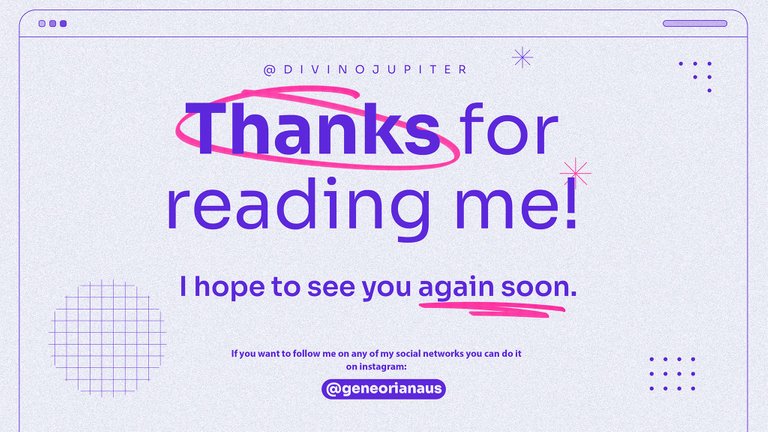
Todas las fotos utilizadas son de mi galería personal.